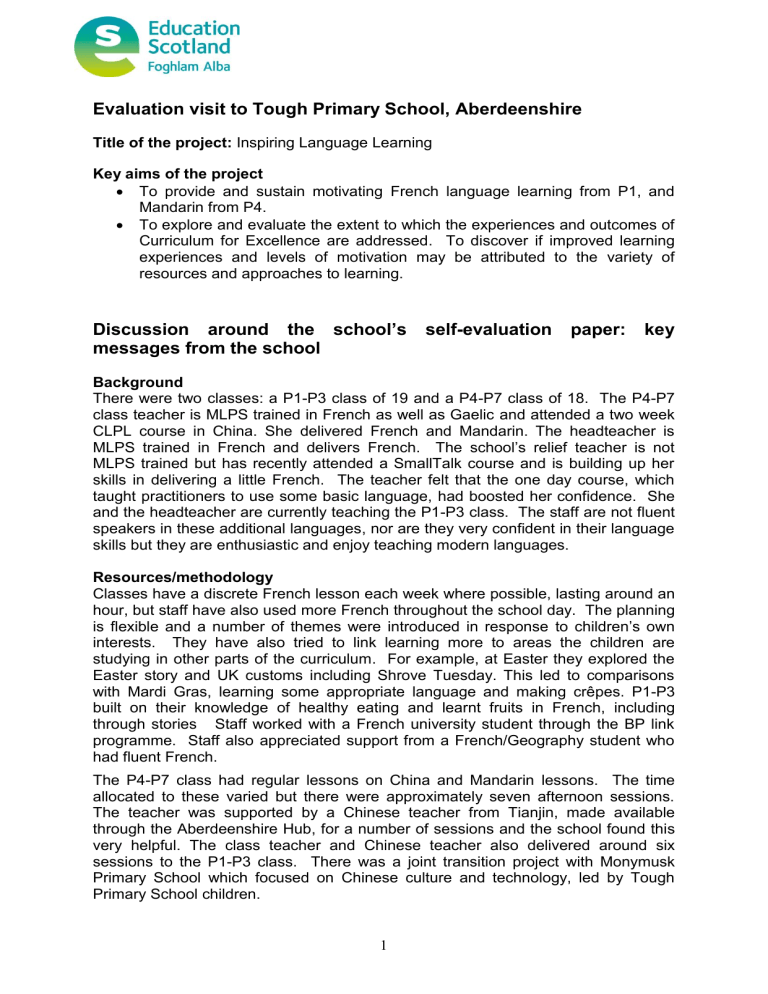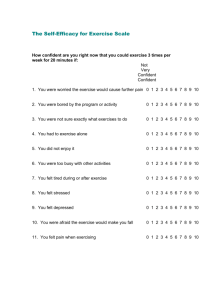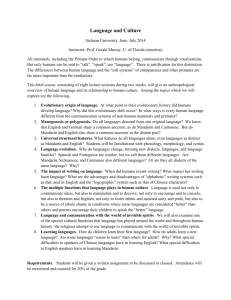, Aberdeenshire Evaluation visit to Tough Primary School

Evaluation visit to Tough Primary School
,
Aberdeenshire
Title of the project: Inspiring Language Learning
Key aims of the project
To provide and sustain motivating French language learning from P1, and
Mandarin from P4.
To explore and evaluate the extent to which the experiences and outcomes of
Curriculum for Excellence are addressed. To discover if improved learning experiences and levels of motivation may be attributed to the variety of resources and approaches to learning.
Discussion around the schoo l’s self-evaluation paper: key messages from the school
Background
There were two classes: a P1-P3 class of 19 and a P4-P7 class of 18. The P4-P7 class teacher is MLPS trained in French as well as Gaelic and attended a two week
CLPL course in China. She delivered French and Mandarin. The headteacher is
MLPS trained in French and deliver s French. The school’s relief teacher is not
MLPS trained but has recently attended a SmallTalk course and is building up her skills in delivering a little French. The teacher felt that the one day course, which taught practitioners to use some basic language, had boosted her confidence. She and the headteacher are currently teaching the P1-P3 class. The staff are not fluent speakers in these additional languages, nor are they very confident in their language skills but they are enthusiastic and enjoy teaching modern languages.
Resources/methodology
Classes have a discret e
French lesson each week where possible, lasting around an hour, but staff have also used more French throughout the school day. The planning is flexible and a number of themes were introduced in response to children’s own interests. They have also tried to link learning more to areas the children are studying in other parts of the curriculum. For example, at Easter they explored the
Easter story and UK customs including Shrove Tuesday. This led to comparisons with Mardi Gras, learning some appropriate language and making crêpes. P1-P3 built on their knowledge of healthy eating and learnt fruits in French, including through stories Staff worked with a French university student through the BP link programme. Staff also appreciated support from a French/Geography student who had fluent French.
The P4-P7 class had regular lessons on China and Mandarin lessons. The time allocated to these varied but there were approximately seven afternoon sessions.
The teacher was supported by a Chinese teacher from Tianjin, made available through the Aberdeenshire Hub, for a number of sessions and the school found this very helpful. The class teacher and Chinese teacher also delivered around six sessions to the P1-P3 class. There was a joint transition project with Monymusk
Primary School which focused on Chinese culture and technology, led by Tough
Primary School children.
1
The school had found the project on China the previous session very motivating for the children. They were keen to investigate if a greater focus on culture, alongside the language, helps engage children and encourages them to see the benefits of language learning.
Staff aimed to provide lessons using an interdisciplinary approach where possible, using resources such as ‘ Passeport pour la Francophonie’ (Education Scotland),
Power Language, materials from the Hanban, from SCILT and from other sources.
These have provided another means of introducing/consolidating existing language and knowledge. Staff have used a wide variety of teaching activities. There has been a focus on learning about the culture, history and geography of the countries through language study.
Children’s experiences and achievements
Staff felt that children were generally motivated and engaged in their learning and had an increased cultural awareness. In the traditional MLPS programme, the study of colours, weather, introductions and numbers was not felt to be inspiring. By using puppets in a story, recording conversations, saving work onto Glow and webconferencing with children in France, staff felt they had provided a more motivating means of covering similar language.
They felt that children’s listening and talking skills were really improving, with children more confident in a wider range of vocabulary and in using their knowledge to build on what they knew such as children at P1-P3 adding colour adjectives to items. Children at P1-P3 were reading flashcards, dominoes, text from books or the interactive whiteboard and using their existing knowledge to work out some of the meaning. There had been little writing at P1-P3.
Staff felt that children at P4-P7 were more confident in talking. Children were able to reproduce complex spoken sentences. They had benefitted from listening to a
French native speaker through resources such as Passeport pour la Francophonie .
There had been some reading and writing through games, flashcards and making animations, as well as through short literary texts such as The Hungry Caterpillar in
French. Children had been learning about Chinese character strokes.
Staff felt that the learning was being reinforced more and that children were able to build on it better. Staff had started to build on their relationship with the secondary school.
Support for learners
Staff felt this can be challenging in multi-stage classes. Having a BP link student had allowed them to group children to enable more support or extension work.
Successes of the pilot (from self-evaluation)
Trying new ideas had motivated staff to improve the teaching and learning of modern languages.
They had found it more meaningful to teach the language alongside other curricular areas.
The pilot had raised the profile of language learning with stakeholders. Staff had discovered the value of linking with other schools. The school had
2
promoted the project and its work through newsletters, a GLOW blog, Parent
Council meetings, a Literacy Week and an Open Afternoon.
They had appreciated the impact of using visitors with a knowledge of languages, such as students, in motivating children and supporting staff.
Staff were very positive about the ES
‘Passeport pour la Francophonie’ resource and would use it to give variety of country in future, to fit in with the social subjects programme.
Issues arising (from the self-evaluation)
IT issues which impacted on links with French colleagues.
Lack of resources for the early stages. Staff would appreciate the Passeport resource at a level to suit younger children also.
The school was keen to send a member of staff on an immersion course in
France.
They were aware of the need to introduce more writing and at a more appropriate level. Staff were lacking confidence in grammar and writing.
They would appreciate a grammar and vocabulary support pack.
The school was a ware of the need to assess and record children’s progress but would appreciate having a framework below second level in order to do this.
There was a need to share more at network level.
Overall evaluation by Education Scotland, based on evaluation activities
Teachers have shown great commitment to the project and demonstrate commendable enthusiasm for promoting the benefits of language learning. They have devoted a large amount of their CLPL time to preparing for the use of new resources and the delivery of the modern language.
Children displayed a very positive attitude towards language learning. Almost all were confident in their use of language. They were motivated by the activities in class and enjoyed their learning. They wanted to learn more languages. In classes, they engaged in a variety of motivating activities which encouraged them to work and talk together. For example, children at P1-P3 were engaged in conversation through the use of puppets. Children in the P4-P7 class were consolidating their Mandarin vocabulary for features of the face through games on the interactive whiteboard.
Children particularly liked finding out about other cultures. They had been fortunate in making links with other speakers through a French school link, visitors such as student teachers and some links with the secondary school. Children were accustomed to hearing French classroom instructions and coped well with this.
Children at P1-P3 were able to hold simple conversations giving personal information confidently. They could engage in simple dialogues with some more complex language, through the medium of puppets. Their study of Little Red Riding
Hood in French had enabled some children to use sentences or phrases from the story such as Voici une petite fille, in their own dialogues
3
Children at P6/P7 were asked to listen to a personal language text in French for understanding of key points. They coped with this well, including understanding unknown vocabulary. They were asked to answer some personal language questions about themselves and almost all were prepared to talk about themselves in French. They used sentences to talk about themselves and their family.
Together, they were able to work out the meaning of a personal language text which included words they did not know. The school provided some examples of children’s writing in the modern language.
Children at all stages were being encouraged to develop strategies for language learning such as comparing French words to English words and working out meaning from the surrounding text. They had learned new vocabulary through reading stories and songs. They were making links with literacy skills such as note taking from internet material. They were developing their knowledge of other cultures.
Children were developing their language skills in L2 well at the early stages. Overall, there was scope for children to be challenged more and to develop their knowledge of the structure of the language, thereby developing their reading and writing skills further as they moved through the primary stages. The school was aware that this was necessary to enable most to be secure in all four skills at second level by the end of P7. Children were developing the confidence and willingness to learn which would enable them to do this.
In Mandarin as L3 , children’s project work had enabled them to develop their understanding of a very different culture. They pronounced the language with confidence, coping mainly at word level, but with the ability to say a few basic sentences. They had a growing vocabulary. They were beginning to recognise the written word and to write some Chinese characters.
The school used a PSA to support those having difficulty in class and has ensured that groups support each other during tasks. Staff would like to challenge children more and would appreciate support with differentiation of materials. They would like support to develop their own knowledge of grammar in order to facilitate greater depth in learning. They suggested input from a visiting teacher for the updating of their own language skills.
At L2 and L3, children were developing language learning skills, including building on what they already knew to form larger phrases. For example, children at P1-P3 added an adjective to describe an object or person. They were learning strategies for remembering words. They were learning to work out the meaning of unknown words by linking them to words they did know and learning to decode the overall sense of a longer text by identifying words they were familiar with.
Children in both classes had covered a variety of themes in terms of vocabulary, mainly linked to what they were doing in other subject areas. This had included themes which would be expected at the primary stages such as numbers, dates, weather and personal information. Children had had the opportunity to consolidate
4
their knowledge through practice in other areas of the curriculum. A few basic grammatical concepts such as masculine and feminine were used and understood although they have not been explicitly taught. The school would like to progress children’s knowledge of structures further to enable children to generate new language more readily.
The school had not yet begun to assess children’s individual progress through the Es and Os although they referred to the Es and Os in their planning. There was scope to make the Es and Os more explicit to the children so that they could identify their own progress more readily. They were using the P7 profile as a way of reflecting on progress. Next steps were for staff to record progress as evidenced mainly through classroom activities.
Overall, children had a very positive experience led by committed staff who value language learning and were encouraging children to do so. Children were very proud of their learning and were confident in speaking another language. At P4-P7, they were keen to show that they had knowledge of two languages and to learn even more languages.
The school achieved its aim of providing motivating French language learning from
P1, and Mandarin from P4. Staff are sure that improved learning experiences and levels of motivation may be attributed to the variety of resources and approaches to learning started this session. They have explored the extent to which the experiences and outcomes of Curriculum for Excellence are being addressed and have noted that they need to encourage more in depth learning through reading and writing. These are all very positive outcomes for the pilot.
5




